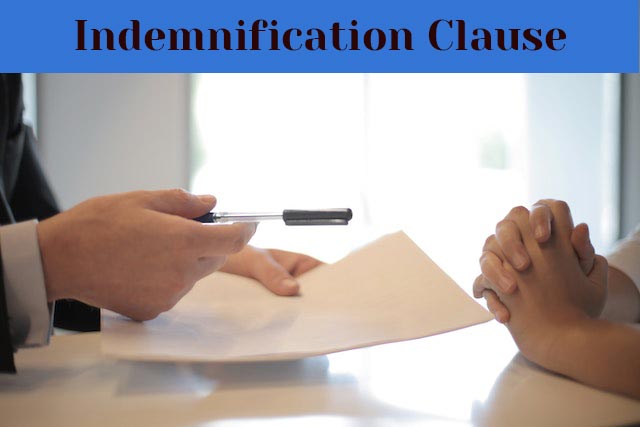Suppose you own a website. You hired someone to write a blog post for your website. That person instead of writing it copies it from a website and sends it to you. As you don’t know about it, you post it on your website. But after some days you get a copyright infringement letter. Now the question arises, who will be liable? The person who owns the website or who wrote the letter? This is why an indemnification clause is important in a contract.
What is an Indemnification Clause
An indemnification clause is a provision in a contract that requires one party to compensate the other party for any losses or damages that may arise from a specified event or occurrence. This type of clause is often included in contracts to protect one party from potential legal liability or financial losses resulting from the actions of the other party. This clause can take many forms, but they generally require one party (the indemnifying party) to reimburse the other party (the indemnified party) for any costs, expenses, or damages that the indemnified party incurs as a result of a specified event or occurrence. The indemnifying party may be required to pay for legal fees, damages, or other costs associated with a lawsuit or other legal proceedings that arise from the specified event.
These clauses are often used in business contracts to protect against potential legal liabilities or financial losses. For example, a company might include an indemnification clause in a contract with a vendor to protect against any damages or losses that the company might incur as a result of the vendor’s actions. Similarly, a company might include an indemnification clause in an employment contract to protect against potential legal liabilities or financial losses that might result from the actions of an employee. Here is an example of an indemnification clause of youtube.

Normally in the clause, these three words are always there. Viz
i. Defend
ii. Indemnify
iii. Hold Harmless
What’s inside an Indemnification Clause?
Indemnification clauses can vary in their language and specific terms, but they generally include the following elements:
- Parties: The indemnification clause should specify which parties are covered by the clause, including the indemnifying party (the party agreeing to indemnify the other party) and the indemnified party (the party being indemnified).
- Scope: The clause should specify the types of losses or damages that are covered under the clause. This might include legal fees, damages, or other costs associated with a lawsuit or other legal proceedings that arise from a specified event or occurrence.
- Event or occurrence: The clause should specify the event or occurrence that triggers the indemnification obligation, such as the actions or omissions of the indemnifying party or the indemnified party.
- Indemnification obligation: The clause should specify the obligations of the indemnifying party, including the requirement to reimburse the indemnified party for any losses or damages that arise from the specified event or occurrence.
- Limitations: The clause may include limitations on the indemnification obligation, such as a cap on the amount of damages that the indemnifying party is required to pay.
What Does It Mean to Indemnify Someone?
To indemnify someone means to compensate that person for any losses or damages that they may have incurred. Indemnification is often used to protect against potential legal liabilities or financial losses that may arise from a specified event or occurrence.
Indemnification can also occur outside of a contract, such as when a person or entity voluntarily agrees to compensate another person or entity for any losses or damages that they may have incurred.
Conclusion
It is important for parties to carefully review and understand the language and terms of the clause before entering into a contract. It is also advisable for parties to seek legal advice to ensure that the clause is fair and reasonable and that it properly reflects the parties’ intentions.
- What is Mens Rea and Actus Reus - February 13, 2024
- Case Summary of Anglo Norwegian Fisheries Case | United Kingdom V Norway - April 7, 2023
- What is a Solicitor? How to Become One - January 9, 2023

